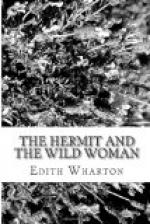The sound of the river seemed to cease altogether: the whole world became silent.
Margaret had trusted her inspiration farther than it appeared likely to carry her. Again she could think of nothing happier than to repeat, on the same witless note of interrogation: “To tell me?”
“You only.”
The constraint, the difficulty, seemed to be on his side now: she divined it by the renewed shifting of his attitude—he was capable, usually, of such fine intervals of immobility—and by a confusion in his utterance that set her own voice throbbing in her throat.
“You’ve been so perfect to me,” he began again. “It’s not my fault if you’ve made me feel that you would understand everything—make allowances for everything—see just how a man may have held out, and fought against a thing—as long as he had the strength. . . . This may be my only chance; and I can’t go away without telling you.”
He had turned from her now, and was staring at the river, so that his profile was projected against the moonlight in all its beautiful young dejection.
There was a slight pause, as though he waited for her to speak; then she leaned forward and laid her hand on his.
“If I have really been—if I have done for you even the least part of what you say . . . what you imagine . . . will you do for me, now, just one thing in return?”
He sat motionless, as if fearing to frighten away the shy touch on his hand, and she left it there, conscious of her gesture only as part of the high ritual of their farewell.
“What do you want me to do?” he asked in a low tone.
“_ Not_ to tell me!” she breathed on a deep note of entreaty.
“_ Not_ to tell you—?”
“Anything—anything—just to leave our . . . our friendship . . . as it has been—as—as a painter, if a friend asked him, might leave a picture—not quite finished, perhaps . . . but all the more exquisite. . . .”
She felt the hand under hers slip away, recover itself, and seek her own, which had flashed out of reach in the same instant—felt the start that swept him round on her as if he had been caught and turned about by the shoulders.
“You—you—?” he stammered, in a strange voice full of fear and tenderness; but she held fast, so centred in her inexorable resolve that she was hardly conscious of the effect her words might be producing.
“Don’t you see,” she hurried on, “don’t you feel how much safer it is—yes, I’m willing to put it so!—how much safer to leave everything undisturbed . . . just as . . . as it has grown of itself . . . without trying to say: ‘It’s this or that’ . . . ? It’s what we each choose to call it to ourselves, after all, isn’t it? Don’t let us try to find a name that . . . that we should both agree upon . . . we probably shouldn’t succeed.” She laughed abruptly. “And ghosts vanish when one names them!” she ended with a break in her voice.




